Litigating Virtue: The Trial of the Chicago 7
Aaron Sorkin doesn’t write the world as it is; he writes it as he wishes it to be. Many film scholars have concluded this after absorbing his body of work, however his penchant for writing about recent history can make them forget about his fantastical indulgences. Reminding ourselves of Sorkin’s romanticism is the key to breaking down his most recent writing and directing effort based upon the aftermath of the 1968 Democratic National Convention in Chicago, IL. The cultural collision that transpired makes for an interesting history lesson, but there is even more moral currency to accrue from Sorkin’s dramatization.
“Chicago is more f****d up than any ten things I’ve ever seen in my life.” This is a smart line from a smart writer, and it’s the perfect embodiment of Sorkin’s view of the world; sharp, honest, layered, and thoughtful. It comes early in the film, and it clues us in quite nicely into the tumultuous moment of which we are bearing witness. In the film, the many factions at the heart of the protesting and violence surrounding the ’68 DNC are litigated inside of a federal courtroom and in the conversations outside of it. The morality behind the Vietnam War, the police state of Chicago’s authorities, the racial prejudices of then-present day America, and a plethora of other ideas are all debated amongst the all-star cast. It’s a grandiose tale, and in the hands of any other writer it would force the audience’s eyes to collectively roll for two hours and ten minutes straight, but written with Sorkin’s pen it is an operatic gesture of virtuosity.
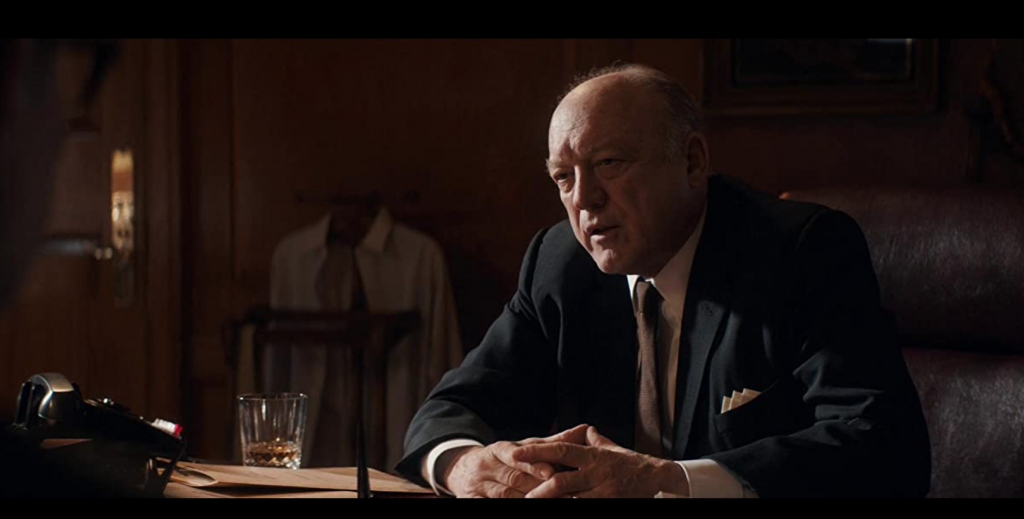
There’s plenty of virtue to go around, and Sorkin himself is a self-proclaimed romantic when it comes to equality of the spirit and mind. In his works, justice befalls the virtuous and the villainous equally. See A Few Good Men, where Nicholson’s villainous USMC Col. Jessup, as well as the two honorable marines on trial against him are all ultimately punished for the lacking areas of their conduct as soldiers. In Chicago 7, every character makes an excellent case for why they were well-intended and principled in their actions during the time of the ’68 protests, as well as during the resulting trial. The film takes place during the court proceedings, whilst also flashing back to the events of the prior year during the actual unrest. This time jumping (of which he is famous for) helps bolster Sorkin’s momentous pace, and it makes conversation and legalese just as thrilling as fist fights and car chases. This is a film populated by highly intelligent and hyper verbal people debating what evolved human beings can do to be decent to one another. There’s something very simple and also monumental about the core values the film weighs, and Sorkin’s adeptness with this dichotomy is what makes this story so cinematic. The ideas in his head alone are big enough to fill the screen.
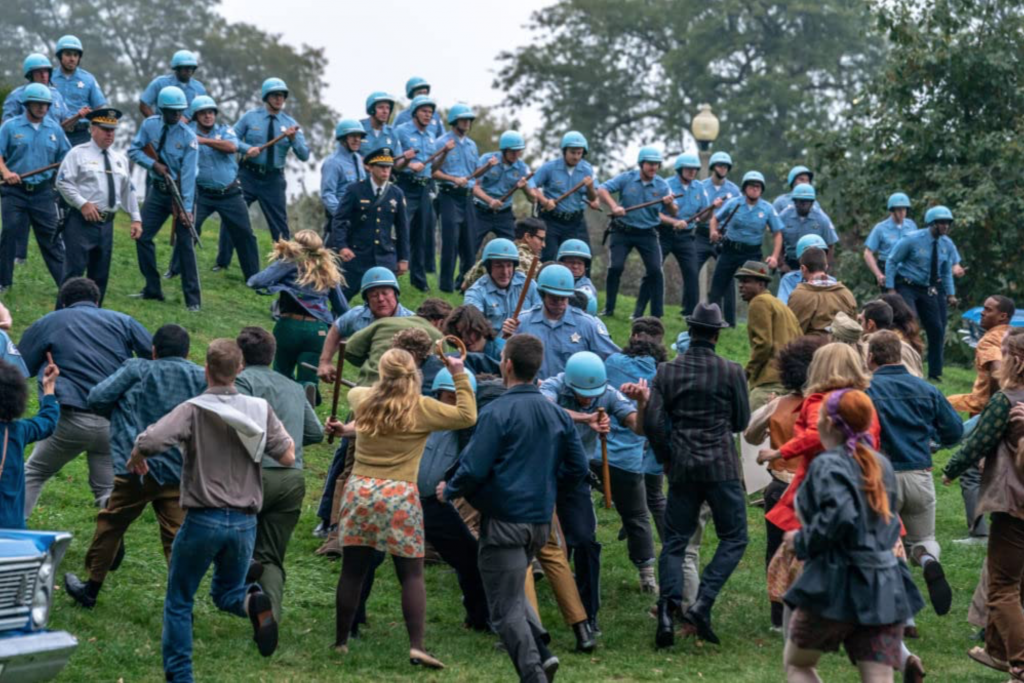
In the film, we see how people on both sides of the case either struggle to exhibit passion or belief, or are in danger of succumbing to it. We see the dangers of falling victim to both apathy (individuals on the prosecuting side), or also being clouded by rage or emotion (the activists on the defense). The result of existing in the extreme of either side, is a failure to communicate or to understand one another. Some of the best sequences of the film are when we see the talks behind closed doors that feature in-fighting within the two camps. One in particular stands out, where the defense attorney for the titular 7 (masterclass performance from Mark Rylance) debates with Tom Hayden, a leader of the Students for a Democratic Society (Eddie Redmayne), about the true inciter of violence in the chaos of the ’68 event. Their exchange illuminates how easily distorted the line of communication becomes, and when a virtuous intent leads to an unwanted outcome.
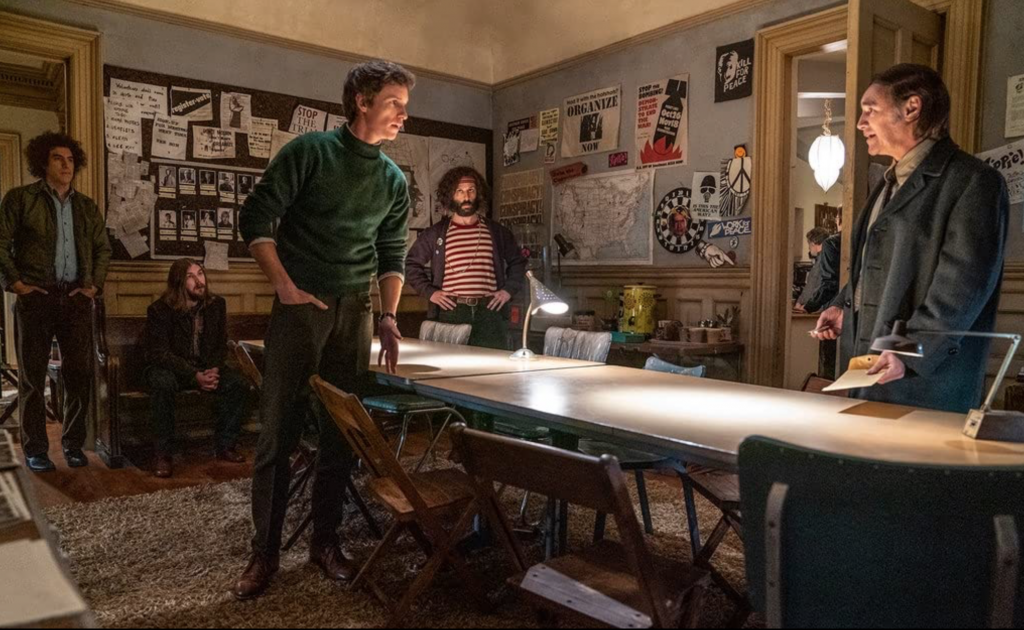
Sorkin’s definition of justice is a true equality of outcomes, where an unbiased and unprejudiced occurrence of balance sweeps over the characters in his world. This outcome is not always beneficial to those who populate his scripts, but the fantasy he asks us to indulge in is essentially what the world would look like if we all stood up for courtesy and trusted in one another. This is the basis of his politics, as we’ve seen in all of his works, where we essentially get the screenplay version “if I were in this person’s shoes, and I was focused, considerate and highly eloquent, this would be the perfect thing to say at this moment.” It’s actually exactly the kind of fiction we go to the movies for. We get the most entertaining, inspiring, and satisfying version of reality we all dream of. Where the world becomes fair, despite those populating it not all starting in the same place. It’s a noble reason to be an artist, and if we subscribe to the thought that you get out of the world that which you put into it, then there’s a lot of good in Aaron Sorkin’s life.
The accusations of “smug” and “snarky” have been leveled against Sorkin’s works before, and if we were to write about his previous television effort, The Newsroom, we too would make that claim. With the exception of a few too many moments of comic relief in this film (mostly from the otherwise great Sacha Baron Cohen and Jeremy Strong performances), there’s the usual earnestness from the script, and although it plays fast and loose with the factual happenings and dialogue of this event, the essence of who these people were feels very much intact. This isn’t documentary cinema, this is entertainment that wishes to teach its audience something about how to treat your neighbors, friends, family, and even your adversaries. This is a contemporary opera, where the institutions of belief that make up a developed society are put to the test, and where every decision that led these people to this moment are put under scrutiny.
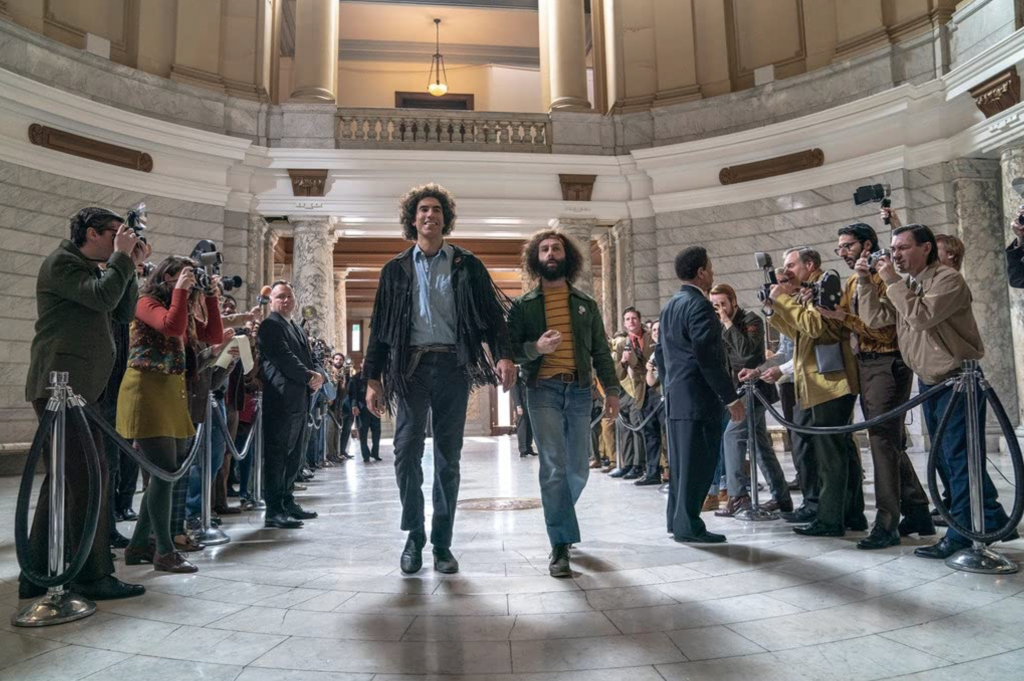
What’s most interesting in Sorkin’s place amongst the left-wing, is that he is both an icon and a detractor for media culture. He has made it clear how he feels about social media, and the extremist ideas and undermining of American society that thrive in technology. From this we can conclude that he’s not a revolutionary, and from his writing we can tell he has a higher level of respect for America’s Constitution than most of his peers do. His writing has matured to a place where it wants to open the door for both sides of an argument to coexist in a tempered and controlled manner.
What’s funny about the discourse of the film, is how most critique comes from racial extremists who believe he uses the Black Panther party as a plot device in the film to enrich the emotional lives of the white characters. To prove this critique to be baseless, we point to perhaps the best sequence of the film, in which Bobby Seale (then-leader of the Party, played b Yahya Abdul-Meteen II) shares his feelings with Tom Hayden about how he feels about him and his white peers co-opting the struggles of the African American. It’s a scathing indictment to the white leftist of today, similarly to how Sorkin used his Broadway adaptation of To Kill a Mockingbird last year to similar effect. In that production, he pointed out the hypocrisy in the virtue-signaling left propping themselves up on the historical plight of other races. What Sorkin’s portrayal of African American characters in the play and this film conclude, is that they don’t have the desire to steal status from any other race. In Chicago 7, Seale sees these protestors for what they are: out of touch. What they fail to grasp is that all Americans simply want to ensure their right to “life, liberty and their pursuit of happiness.”
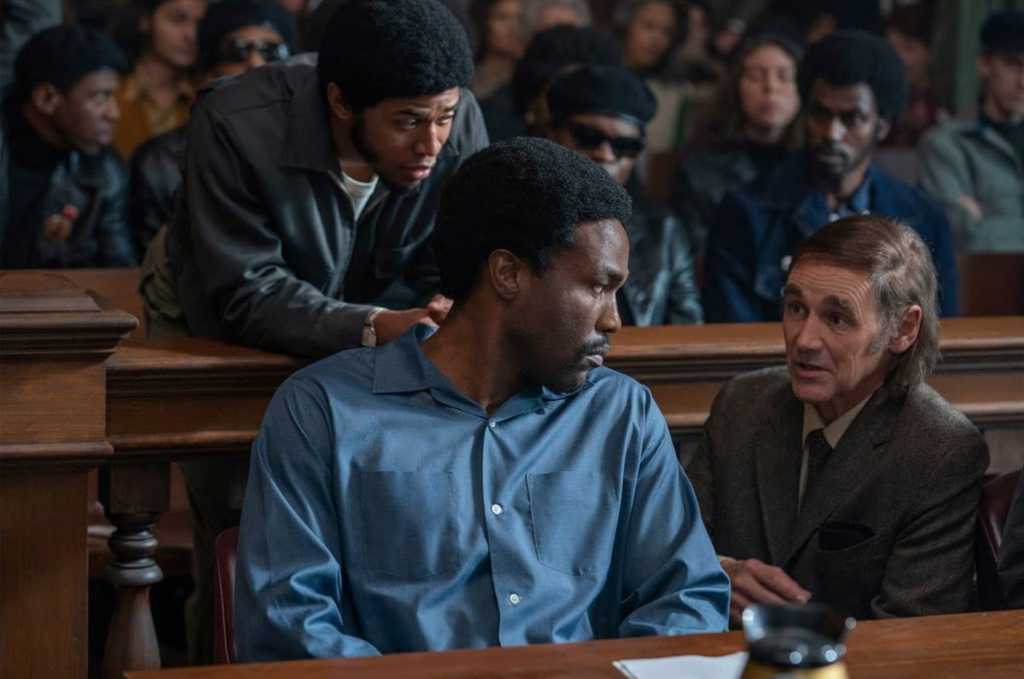
Many critics have hailed this film to be a timely piece of art. Whilst they are correct in a great many ways, it’s easy to get a sense that they are missing the point of Aaron’s classical work. Sorkin wrote this screenplay in 2007, originally to be directed Steven Spielberg, but the ’07-’08 Writers’ Guild strike squashed those plans. In the years since, the only adjustments to this screenplay were stylistic and grammatical. There was no retro-fitting this script to comment on the moment of the current presidency or cultural shifts. As such, this film does not call for the destruction of America as a place of individual freedom, which the leftists who praise this film most certainly are advocating for. It simply calls for a reminder of what could be accomplished by being an American. A place where the intrusion of an all-powerful court/government (embodied in Frank Langella’s detestable judge) was the one true evil from differing ideologies to find common understanding. A place where corrupt politicians and municipalities (such as the Daley family and the sordid history of Chicago) would always eventually work to undermine their own constituents. The difference between the world we know and the world that Sorkin dreams of, is that in his world justice will be swift and virtue will prevail, even if it means that good people lose.
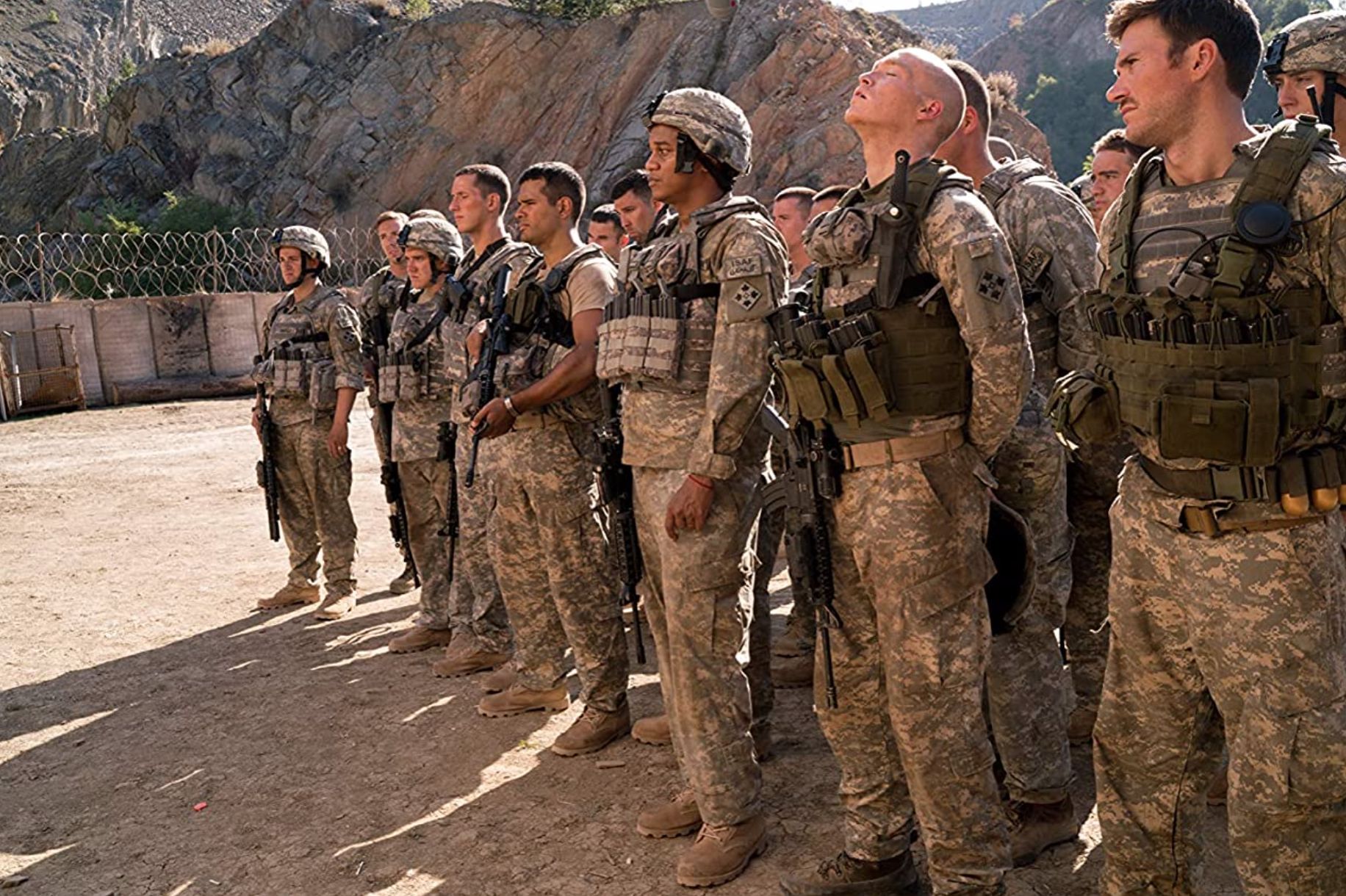

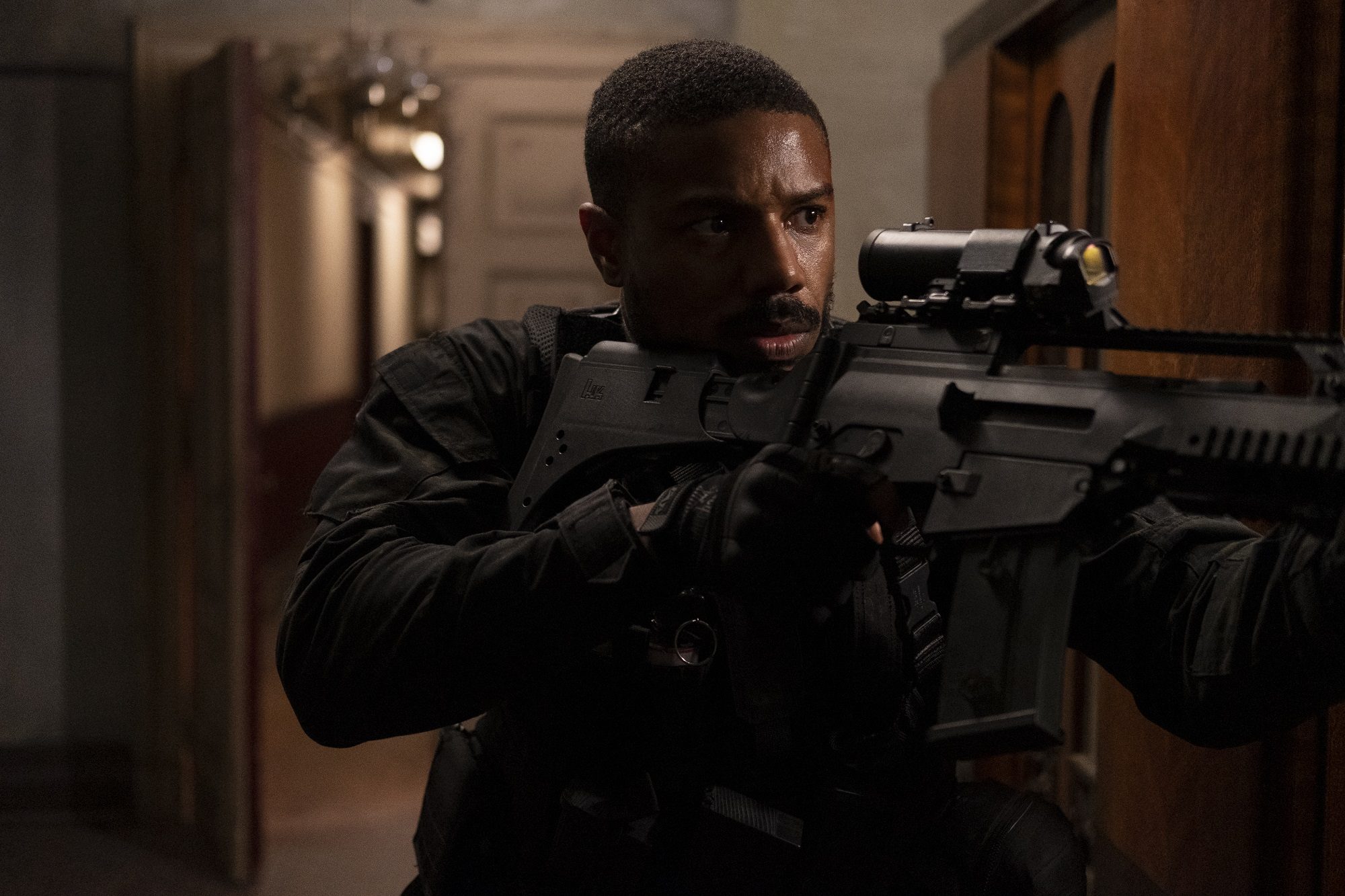
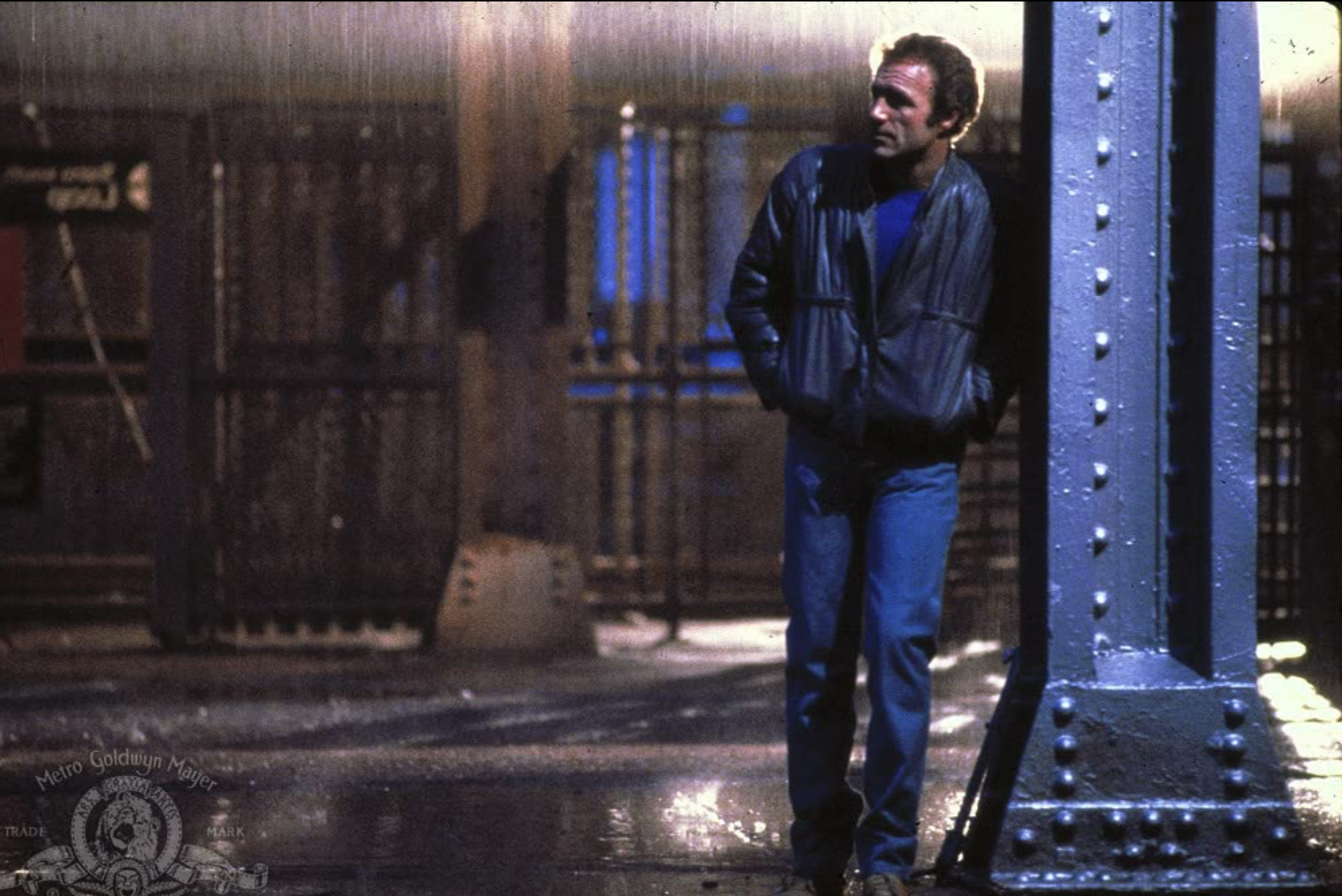
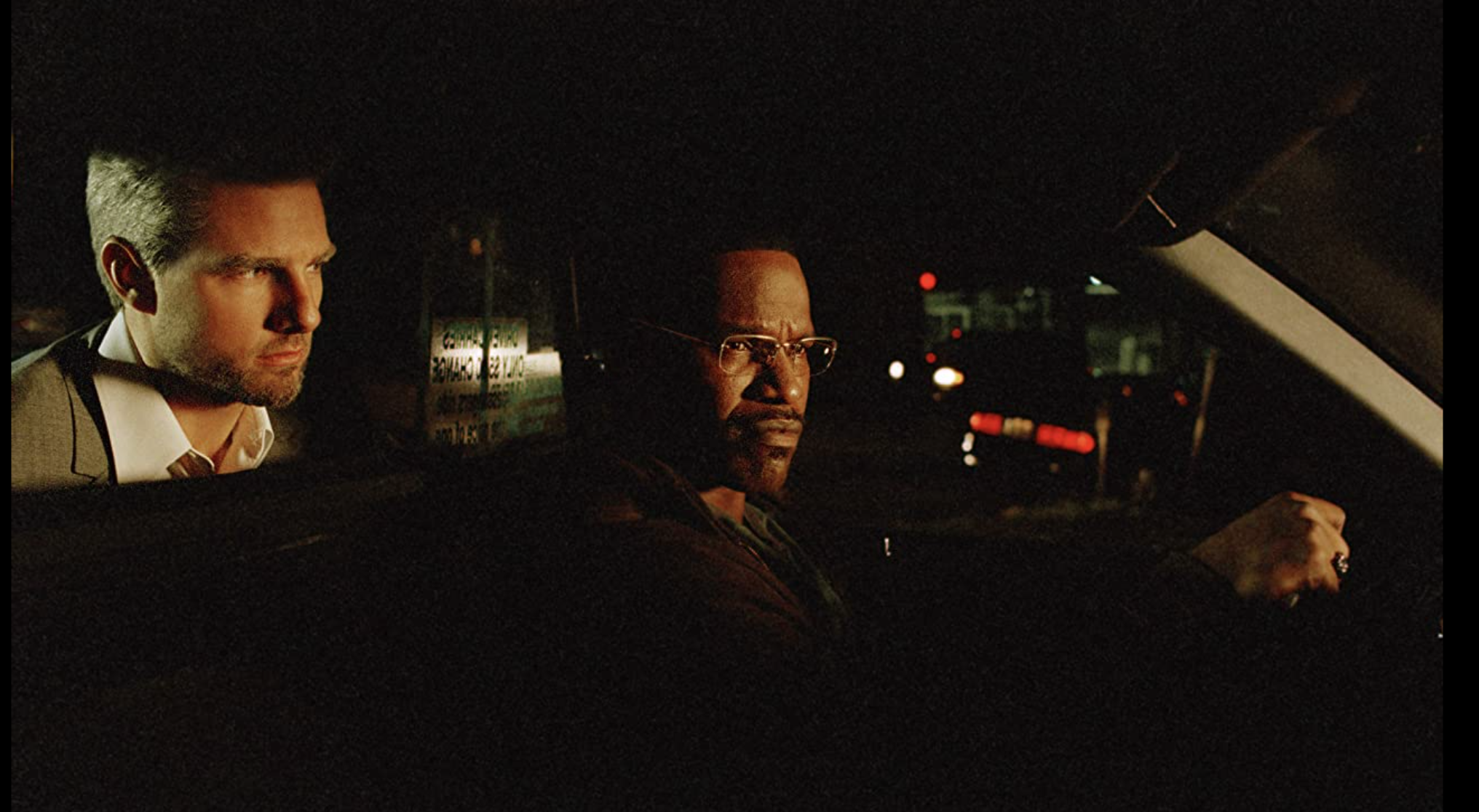

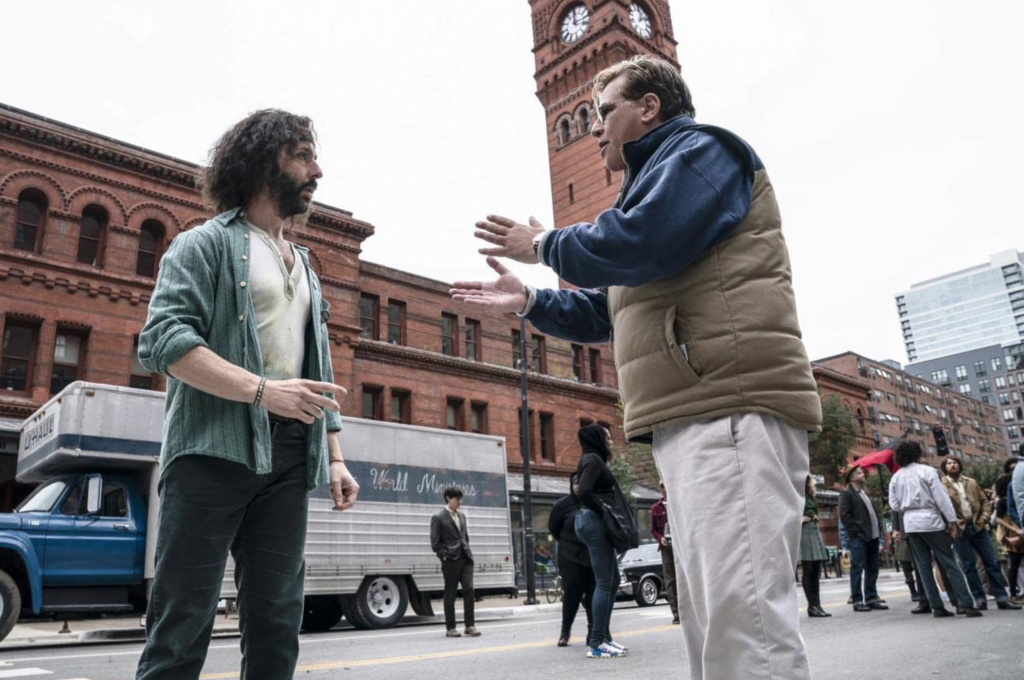
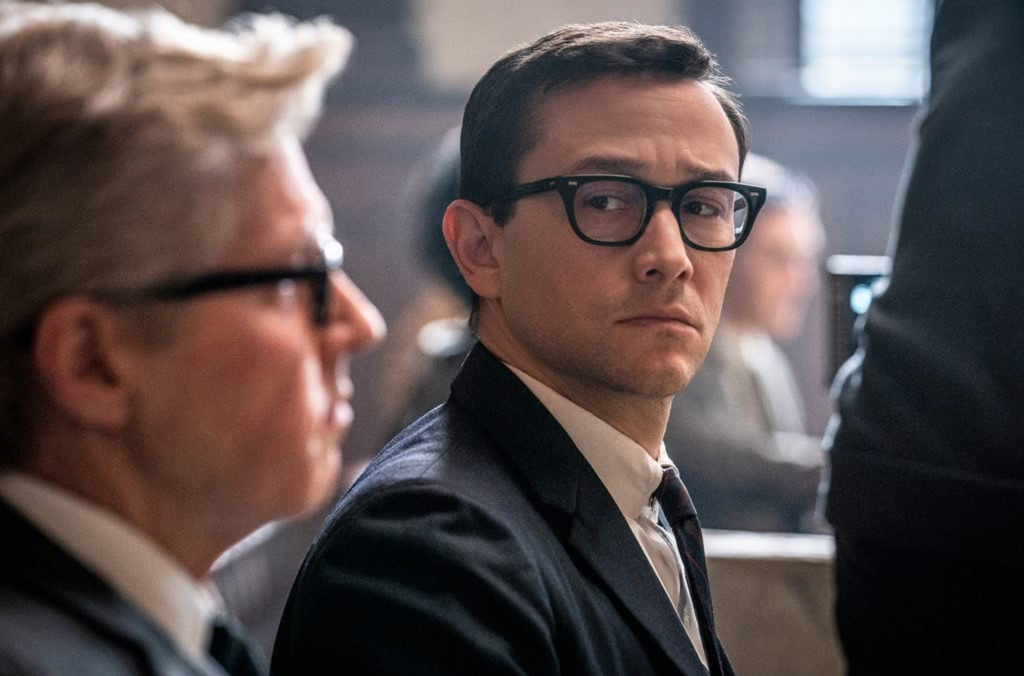
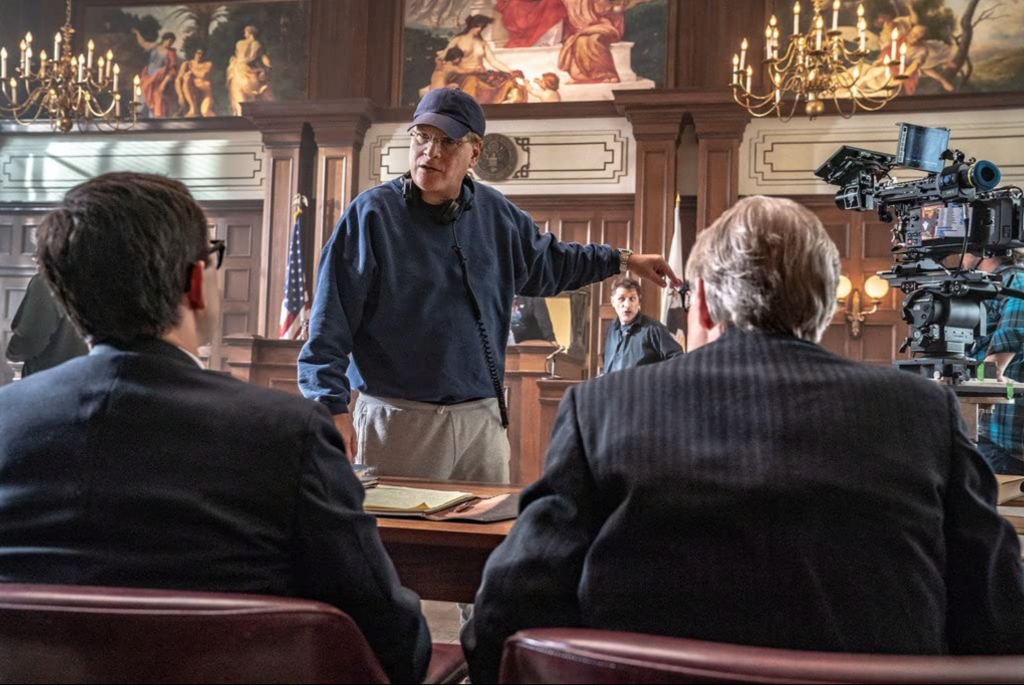
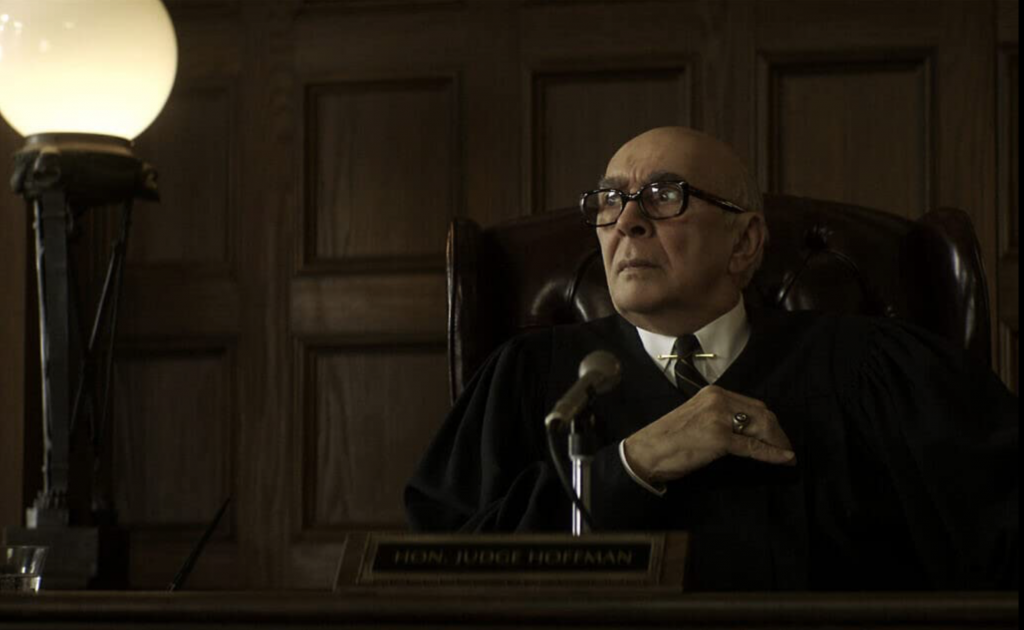


Comments